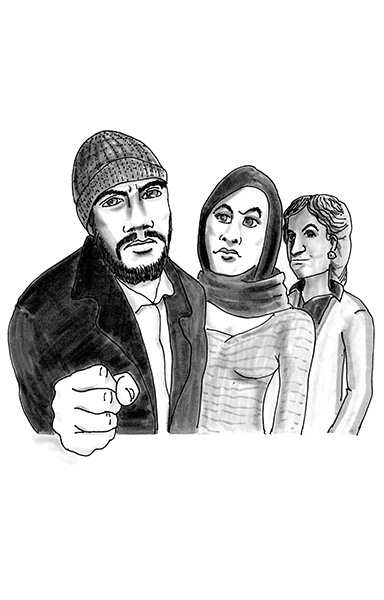Sweet Afton
by Jaki McCarrick
Directed by Tracy Cameron Francis
Aug 7 – Sep 5, 2021
An Online Audio Play
A brother and sister flee Afghanistan to become asylum seekers in Ireland, but instead of refuge they are met with Direct Provision — Ireland’s inhumane system of endless incarceration. Banned from working or even cooking their own meals, Kazim and Leila struggle with isolation and the limbo of uncertainty. With the help of their Irish friend Andrea, they fight to end DP for good.
Show sponsors: Harold and Carole Goldstein
Season sponsor: Ronni Lacroute
- World Premiere
- Commissioned by Corrib Theatre

- Running time: 30 minutes
Events:
- Aug 7: 12pm Online launch party with first access to audio play and guest speaker Mpho Mokotso from the Movement of Asylum Seekers in Ireland (MASI).
- Aug 7 @ 2pm – Sep 5: Listen any time
-
“... a story of race, politics and mental health that is as moving as it is enlightening.”
Bennett Campbell Ferguson, Willamette Week
-
“A timely and topical situation, to say the least.”
Dennis Sparks, All Things Performing Arts
-
“What stands out is the pluck and determination of these two young asylum seekers ...”
Judy Nedry, Theatre Reviews
VIDEO
Sweet Afton Promo Trailer
Jacki McCarrick Interview Trailer
Justine Nakase Interview with Mpho Mokotso
Justine Nakase Interview with Jaki McCarrick

What's Sweet Afton?
Sweet Afton was an Irish brand of short, unfiltered cigarettes made with Virginia tobacco and produced by P.J. Carroll & Co., Dundalk, Ireland, now a subsidiary of British American Tobacco. The Sweet Afton brand was launched by Carroll’s in 1919 to celebrate the link between Dundalk and the national poet of Scotland, Robert Burns.” “The name is taken from Burns’ poem “Sweet Afton”, which itself takes its title from the poem’s first stanza:
“Flow gently, sweet Afton, amang thy green braes
Flow gently, I’ll sing thee a song in thy praise
My Mary’s asleep by they murmuring stream
Flow gently, sweet Afton, disturb not her dream”
The Direct Provision system in Ireland:
-
Ireland’s strange cruel system for asylum seekers.
The New Yorker
-
A collective that seeks justice, freedom and dignity for all asylum seekers.
Movement of Asylum Seekers in Ireland
-
Grassroots campaign started by asylum seekers in Monaghan.
Abolish Direct Provision Ireland
About Sweet Afton and Direct Provision by Sara Martín-Ruiz.
Ireland, the country of the hundred thousand welcomes… or is it? Since the year 2000, thousands of people of all ages and nationalities who arrived in Ireland in search of safety have been kept in open prison centres throughout the country, with their human and political rights breached on a daily basis. Since 2004, children born and raised in Ireland are being deported to countries they have never been in, while a person who has never been in Ireland, but whose grandparent was an Irish citizen, has a right to obtain Irish citizenship. Why does this happen? Jaki McCarrick’s play, Sweet Afton, creatively confronts the traditional image of the Irish Republic as being a welcoming place characterised by emigration with the uncomfortable fact that institutional racism has permeated Irish society since the dawn of the 21st century, as the results of the 2004 Citizenship Referendum and the Direct Provision system illustrate.
The system of Direct Provision and Dispersal, established in late 1999 and still ongoing, is the for-profit scheme through which the Irish state manages the lives of international protection applicants, like Kazim and Leila Karimi in McCarrick’s play. Following this system, asylum seekers are lodged on a full-board basis in Direct Provision Centres throughout the country, often former hostels or holiday camps, and usually isolated from mainstream society. Asylum seekers are factually banned from working or entering third level education; whole families have to share a single room, and single people are forced to share a room with total strangers; they are made to live in state-sponsored poverty with a meagre weekly allowance (€38.80 per adult and €29.80 per child), not being able to choose where to live, or even when or what to eat.
In fact, that is how the three characters in Sweet Afton come to know each other: Andrea works in the canteen of the Direct Provision centre where siblings Kazim and Leila live while their asylum claims are processed. “But who knows how long this will take?”, claims Leila at one point. Indeed, time is one of the main problems of the institutionalised living that is Direct Provision. Although intended as a short-term solution, not to last for longer than 6 months, it is not unusual for the months to turn into years. Keeping vulnerable people who have fled unspeakable horrors before arriving in Ireland just to keep them in legal limbo for years on end usually results in re-traumatisation. Research shows that asylum seekers are five times more likely to experience mental health and psychiatric problems, such as depression, anxiety and PTSD.
In her play, McCarrick highlights the paradox on which Irish citizenship is based on nowadays — after five years in the Direct Provision system, Kazim and Leila obtain Irish passports not because of their asylum claims, but because the law recognises their right to Irish citizenship as grandchildren of an Irish grandfather whom they had never met. In its exploration of the personal consequences of state policies which fail to offer safety to those who need it the most, the situation presented in Sweet Afton finds parallelisms across time and space: in the Magdalen Laundries of the Irish past, or the ICE units in the United States nowadays. Sweet Afton is a reminder that, behind impersonal figures we see in the media, and living among us, there are still too many voices whose stories we systematically prefer to ignore. After 21 years, and thanks to the tireless effort of current and former asylum seekers, Direct Provision is no longer an unknown reality for most people in Ireland. May this play raise international awareness about the way our states treat those who have fled their countries in search of a safe place to call home.
Sara Martín-Ruiz is an independent scholar, and a PhD candidate at the University of the Balearic Islands, Spain. Her research is widely informed and shaped by intersectional feminism and antiracism. She has researched and published on contemporary Irish literature written by asylum-seeking and refugee female authors.
CAST

ANDREA

KAZIM

LEILA
CREATIVE TEAM AND CREW

DIRECTOR

PLAYWRIGHT

AUDIO

ORIGINAL MUSIC
Lauren Bloom Hanover
Lauren Bloom Hanover is pleased to be making her first appearance with Corrib Theatre. Previous credits include The Actors Company Theatre (NY), Columbia Stages (NY), Studio 12 Ensemble (NY), the Alabama Shakespeare Festival, Berkeley Repertory Theatre, Capital Stage (Sacramento), and Just Theater (Berkeley). Locally she has appeared with Portland Center Stage, Profile Theatre, CoHo Productions, and in staged readings at Artists Repertory Theatre and Portland Shakespeare Project. She received her MFA from the Alabama Shakespeare Festival. laurenbloomhanover.com
Shahjehan Khan
Fatima Wardak
Fatima is an actor, writer, and activist based in Brooklyn, NY. She holds degrees in both Theatre/Acting and Political Science/International Relations from Western Washington University. She has studied devising and composition extensively, and loves to collaborate with curious artists to develop original and exciting new works. A lover of physical comedy, Fatima also has training in clown and commedia dell’arte, and recently launched a web series called The Adventures of Pudge & Bucco (you can find videos on YouTube or Instagram @pudgeandbucco). She loves to play and learn, and hopes to use her art to help bring in a new age of racial diversity and equity in the arts. When she isn’t working, you can find her eating ice cream and enjoying the outdoors; true to her West Coast roots.
fatimawardak.com
Tracy Cameron Francis
Tracy Cameron Francis is a first-generation Egyptian-American director, interdisciplinary artist, and producer. She is currently the artistic director of Boom Arts and formerly was the co-founder and artistic director of Hybrid Theatre Works in New York, which focused on international collaboration and social justice. She was a 2017 TCG Rising Leader of Color fellow, is a core member of Theatre Without Borders, and currently serves on the steering committee for the newly formed Middle East and North African Theatre Makers Alliance. She holds a BA from Fordham University in Middle Eastern studies and theatre, is a member of the Lincoln Center Director’s Lab, and an associate member of SDC.
As a freelance director, Tracy’s work has been seen in New York at HERE Arts Center, The Culture Project, NY International Fringe Festival, Manhattan Shakespeare Project, NY Arab Comedy Festival, Center for Performance Research, Noor Theatre, Brooklyn Lyceum, LaMama Culture Hub, PEN World Voices Festival, and others; internationally at the Falaki Theatre (Egypt), Ubumuntu Festival (Rwanda) and LaMama Umbria (Italy); and regionally with Boom Arts, Teatro Milagro, and Corrib Theatre in Portland, Oregon, and Williamstown Theatre Festival in Massachusetts. She has assisted directors Josh Fox, Sam Gold, Tamara Fisch and Gia Forakis.
Francis has developed new work through staged readings and workshops at Atlantic Theatre Company, New York Theatre Workshop, O’Neill National Musical Theatre Conference, Red Bull Theatre, Portland Center Stage, Corrib Theatre, the Lark, T.B.A. Festival, and others.
As an interdisciplinary artist, Cameron has created site specific performance art merging movement, video, and text for Bushwick Open Studios Performance Art Showcase, Brooklyn Fireproof Gallery, the W Hotel NY, Alwan Center for the Arts, JAW at Portland Center Stage, Queens Arts Council, and Hybrid Theatre Works.
She has worked in television as a shadow director for Dan Minahan on the HBO series True Blood and as an intern for Saturday Night Live. She currently serves as the festival director of the Cascade Festival of African Film, which is the longest running African film festival in the U.S. and includes a series of new African play readings.
As an educator, Tracy has served as a teaching artist for recent immigrants at the International Center in New York, and has guest directed at Fordham University and NYU’s Strasberg institute. She is also a coach for Playwrite inc., working with youth.
Jaki McCarrick
Jaki McCarrick is an award-winning writer of plays, poetry and fiction. A former winner of the Papatango Prize for New Writing (for her play Leopoldville), her play Belfast Girls was developed at the National Theatre Studio in London and was shortlisted for the Susan Smith Blackburn Prize and the 2014 BBC Tony Doyle Award. It premiered in the US in Chicago in 2015 to much critical acclaim and has since been staged many times internationally. Corrib Theatre staged the play in 2018. Belfast Girls premiered in Australia in 2019 and had its European premiere in Sweden in the same year. Her play The Naturalists premiered in 2018 at the Soho Repertory Theatre, New York, to rave reviews. Jaki's plays have been published by Samuel French, Routledge, and Aurora Metro. Her debut short story collection, The Scattering, was published by Seren Books and was shortlisted for the 2014 Edge Hill Prize. The collection includes her story The Visit, which won the Wasafiri Prize for Short Fiction. Longlisted in 2014 for the inaugural Irish Fiction Laureate, she is currently editing her first novel.
Adam Liberman
Adam first got involved in theatre at Beaverton High School during the era of the amazing James N. Erickson, and went on to get a BA in drama, with an emphasis in lighting design, at the University of Washington (where he also studied film-making). As a major sound designer in the Bay Area, he designed over 40 shows and was a resident designer for many years at Berkeley Jewish Theatre and Lorraine Hansberry Theatre in San Francisco. He also studied acting at the Jean Shelton Acting School (aka Shelton Studios). Adam worked as a technical support engineer and technical writer in audio test and measurement for nearly ten years, and is an expert in audio testing and programming audio test automation. At Liberman Sound, which he has operated for over thirty years, he has designed, maintained, and modified audio equipment for many major motion pictures and TV shows. He also worked for many years as a production sound mixer for feature films, commercials, and documentaries, and in post-production sound as a mix engineer. Adam worked in radio at KPFA for over 15 years, as a news reporter, maintenance engineer, instructor, and on-air board-op. He also has a graduate level certificate in TESOL from UC Berkeley Extension, and has taught English in the US and in Guatemala. He sang songs for social justice in the La Peña Chorus in Spanish for twenty years, where he also co-led musical tours to Cuba, Chile, and Mexico. For Corrib, he has co-led the theatre tours to Ireland. He has also registered students to attend an intensive Spanish language school in Guatemala for the last 20 years. Other areas of expertise include programming (C#, PHP, LabVIEW, Javascript, MySQL, etc), database design, web design, and photography. Adam is a member of AES and IEEE.
Shahjehan Khan
Shahjehan is a voice-over artist, actor, and musician based in Boston. You can hear him as "Matteo" on RomComPods, which debuted at #1 on Apple Fiction Podcasts; watch him as Humayun in the first-ever virtual staged reading of Rajiv Joseph's Guards at the Taj (produced by Soho Shakes and directed by Kanika Vaish); and listen to his internationally acclaimed South Asian American punk band The Kominas (as featured in RollingStone, The Guardian, PAPER, CNN, Mic), anywhere you can get the internet.
Ever since his junior high school drama teacher convinced him to spray paint his strategically styled mushroom haircut grey in preparation to play the lead role of Moss Rosenhart in On Broadway, he's had an unquenchable thirst for performance. He had no idea that even though it took him a year to learn how to tune a guitar that one day he'd tour the world in a rock band, or that a producer from Audible would hear him on NPR and ask him to do an Audiobook, thereby launching his voiceover career.
These days, you can find Shaj in his home studio trying his hardest not to be typecast as the brown Jim from The Office (but he'll gladly narrate your video), working on new music side projects like Chaand Sequence (featured in the digital exhibit American Muslim Futures at the Shangri La Museum of Islamic Art and Architecture), or attempting to write his first mini-series. He also recently joined Rifelion Media as a producer and host to help lead the company’s mission to elevate diverse voices, focused on creating and releasing content created by and featuring those in the minority majority.
shahjehankhan.com

